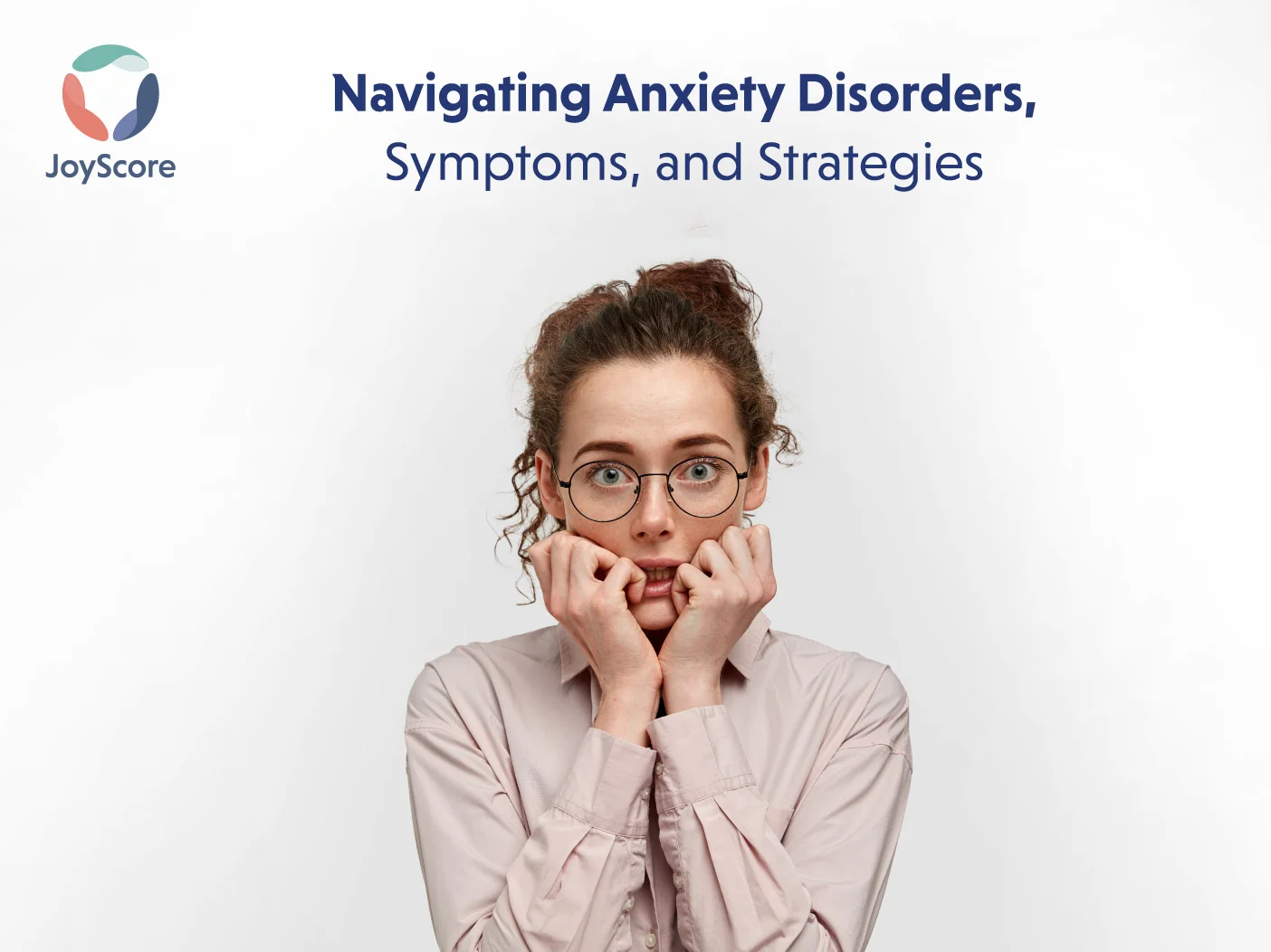In today’s fast-paced world, it’s common for many of us to experience some anxiety. However, when anxiety becomes a persistent and overwhelming presence, it may be an indication of an anxiety disorder. Anxiety disorders stand as the most common mental health condition globally, affecting millions of people across the planet. Download Joyscore to explore the various types of anxiety disorders, learn about the symptoms, and understand practical strategies to help you manage and reduce anxiety in your daily life.
I. Types of Anxiety Disorders
A. Generalised Anxiety Disorder (GAD)
Generalized Anxiety Disorder, often abbreviated as GAD, is characterized by extreme and uncontrollable worry about a wide range of issues, even when there is little or no reason for concern. Symptoms of GAD may include restlessness, muscle tension, irritability, and difficulty concentrating. The causes of GAD can be complex, often involving a combination of genetic, environmental, and psychological factors. Managing anxiety in daily life can be challenging for individuals with GAD.
B. Social Anxiety Disorder (SAD)
Social Anxiety Disorder, or SAD, revolves around an intense fear of social situations and interactions. Individuals with SAD often experience intense anxiety, self-consciousness, and fear of judgment in social settings. This can result in avoiding social interactions, potentially impeding personal and professional development. SAD may arise from genetic predisposition, upbringing, and social experiences. Coping with different anxiety disorders, like SAD, requires specialized strategies.
C. Panic Disorder
Sudden and recurring panic attacks characterize a panic disorder. These attacks involve intense physical sensations such as a racing heart, shortness of breath, and a sense of impending doom. Panic attacks can be terrifying and debilitating, often leading to a fear of having more attacks. The precise origins of a panic disorder remain incompletely elucidated; nevertheless, it is plausible that genetic influences, alterations in brain chemistry, and the impact of stressful life occurrences could play a role. Managing anxiety in daily life is particularly challenging for individuals with panic disorder.
D. Specific Phobias
Specific Phobias encompass an extreme and unreasonable dread associated with a specific object, scenario, or living being. Common examples include fear of heights, spiders, or flying. Individuals who suffer from specific phobias will go to great lengths to evade the source of their fear. Coming into contact with their fear can also induce intense anxiety or panic.
Specific phobias often develop during childhood and can be influenced by genetics and learned behaviors. Learning to cope with different anxiety disorders, including specific phobias, is essential for improving the quality of life.
II. Symptoms of Anxiety Disorders
Anxiety disorders manifest in various ways, affecting the body, emotions, and behaviors of those who experience them. Coping with different anxiety disorders requires an understanding of these symptoms.
A. Physical Symptoms
Physical anxiety symptoms can be distressing, including rapid heartbeat, sweating, trembling muscle tension, and gastrointestinal discomfort. These symptoms are often a result of the body’s “fight or flight” response, preparing us to deal with perceived threats. Managing anxiety in daily life often means addressing these physical symptoms.
B. Emotional Symptoms
Emotionally, anxiety disorders can lead to persistent fear, apprehension, and irritability. Over time, untreated anxiety can contribute to developing other mental health conditions, such as depression. Coping with different anxiety disorders involves recognizing and addressing these emotional challenges. Anxiety can significantly impact behavior. Individuals suffering from anxiety disorders may avoid circumstances or endeavors that provoke their anxiety, potentially constraining their daily life.
C. Behavioral Symptoms
schedules and prospects for personal development. Some individuals may develop compulsive behaviors or rituals to cope with their anxiety. Coping with different anxiety disorders often means finding alternative behaviors that promote a sense of control.
III. Practical Strategies for Managing and Reducing Anxiety in Daily Life
Managing and reducing anxiety is possible with the right strategies and support:
A. Lifestyle Changes
1. Diet and Exercise: A balanced diet and regular physical activity can profoundly impact anxiety levels. Exercise releases endorphins, natural mood lifters, while a nutritious diet provides the essential nutrients the brain needs to function optimally. These lifestyle changes are essential for managing anxiety in daily life.
2. Sleep and Stress Management: Prioritize good sleep hygiene and stress management techniques like meditation, yoga, or mindfulness to promote relaxation and reduce anxiety. These strategies are precious for individuals coping with different anxiety disorders.
B. Cognitive-Behavioral Techniques
1. Cognitive-Behavioral Therapy (CBT): CBT is a highly effective therapeutic approach for managing anxiety. It helps individuals to find negative thought patterns and change their behaviors accordingly. CBT is an evidence-based approach for coping with different anxiety disorders.
2. Exposure Therapy: This form of CBT involves gradually facing feared situations or objects to reduce anxiety over time. It can be highly effective for specific phobias and social anxiety, providing essential tools for managing anxiety in daily life.
C. Relaxation and Mindfulness

1. Deep Breathing: Practice breathing exercises to calm your nervous system during anxiety. These techniques are beneficial for coping with different anxiety disorders.
2. Progressive Muscle Relaxation: This technique involves systematically tensing and relaxing muscle groups to reduce physical tension and promote relaxation. It’s a valuable tool for managing anxiety in daily life.
3. Mindfulness Meditation: Regular mindfulness meditation can help you stay present and reduce the rumination that often accompanies anxiety. It is especially beneficial for individuals coping with different anxiety disorders.
D. Seeking Professional Help

1. Therapy: Consider seeking help from a licensed therapist or counselor, especially if your anxiety significantly impacts your daily life. They can provide tailored strategies and support for coping with different anxiety disorders.
2. Medication: In some cases, medication prescribed by a healthcare professional may be necessary to manage severe anxiety symptoms. Medication can be a valuable component of treatment for those coping with different anxiety disorders.
Conclusion
In the grand symphony of life, managing anxiety in daily life is like mastering a complex instrument. It requires patience and practice. Anxiety disorders may cast a shadow, but they don’t need to be the conductor of your life’s orchestra. By embracing knowledge, recognizing the nuances of your anxiety, and conducting the harmonious symphony of self-care, you can lead a life that resonates with fulfillment and purpose. Seeking professional support is a testament to your inner strength, a reminder that you don’t need to face this journey alone. With every note of progress, you compose a more serene and confident melody that reverberates through the corridors of your well-being. So, continue your journey through the intricate cadence of life, for managing anxiety is the exquisite art of crafting your beautiful masterpiece.



